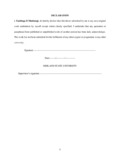Please use this identifier to cite or link to this item:
https://cris.library.msu.ac.zw//handle/11408/594| Title: | Germination performance and β-1.3-glucanase expression of tobacco (nocotiana tabacum L) seeds to after-ripening temperature, dry heat treatment and imbibition solutions | Authors: | Mudzengi, Tashinga Donemore | Keywords: | Tobacco production | Issue Date: | Nov-2014 | Publisher: | Midlands Sate University | Abstract: | Erratic seed germination is one of the major challenges affecting tobacco production and adoption of improved varieties. This problem can be attributed to seed dormancy and environmental conditions. After-ripening is one of the pragmatic approaches used to enhance the germination of freshly harvested tobacco seeds however the process of after-ripening is a slow and there is need to explore other approaches such as imbibition in phyto-hormones (gibberellic acid and benzyl adenine), imbibition in hydrogen peroxide and dry heat treatment. The aim of the study was to determine the effect of after-ripening temperature, dry heat treatment and imbibition solutions on germination performance and β-1.3-glucanase expression of two selected new tobacco varieties viz KRK 26 R and T71. In the first experiment the effect of after-ripening temperature and imbibition solution effect on tobacco seed germination performance under four different germination environments (20 oC light, 20 oC dark, 30 oC light and 30 oC dark) was evaluated. This first experiment was a 2 x 4 factorial experiment in a completely randomised design with after-ripening temperature at two levels (5 oC and 30 oC) and imbibition solution in four levels (benzyl adenine, distilled water, gibberellic acid and hydrogen peroxide). Freshly harvested seeds were sampled from the two after-ripening temperatures every two weeks for eight weeks and imbibed in the four respective imbibition solutions. In the second experiment the effect of after- ripening temperature and imbibition solution on β-1, 3-glucanase activity in T71 and KRK 26 R incubated under 30 oC light and 30 oC dark was determined using the similar design as the first experiment. The enzyme activity of seeds stored for eight weeks at the two respective after ripening temperatures and imbibed in the four solutions was determined using the reducing sugar spectrophotometry method. The objective of the third experiment was to determine the effect of dry heat treatment (DHT) and imbibition solution on tobacco seed germination percentage performance under 30 oC light and 30 oC dark. This third experiment was a 4 x 4 factorial experiment laid out in completely randomised design with DHT done at 37 oC. The DHT had four levels (30 oC after-ripened seed + no DHT, 5 oC after-ripened seed + no DHT, 30 oC after-ripened seed + seven days DHT and 5 oC after-ripened seed + seven days DHT) and imbibition solution had four levels (benzyl adenine, distilled water, gibberellic acid and hydrogen peroxide). In the first experiment after-ripening temperature and imbibition solutions had interaction (P < 0.05) in all the varieties across all the weeks after storage (WAS) except for T71 (at 6 and 8 WAS) and KRK 26 R (2 and 4 WAS) seeds incubated at 20 oC dark. Under 20oC light seeds after-ripened at 30 oC and imbibed in either hydrogen peroxide or water attained the highest germination rate. However using phyto-hormones did not significant improve germination rate except gibberellic acid for T71 seeds at 2 and 8 WAS. The first experiment also showed that gibberellic acid significantly improves germination percentage of the two varieties incubated in 20 oC dark, 30 oC light and 30 oC dark. Under similar conditions seeds after-ripened at 30 oC marginally improves germination regardless of the imbibition solutions. An interaction was noted between imbibition solution and after-ripening in the second experiment (P < 0.05) except for 30 oC dark incubated T71 seeds (P > 0.05). The second experiment showed that β-1,3–glucanase activity is enhanced by exogenous application of gibberellic acid under both 30 oC light and 30 oC dark. The exposure seeds at 30 oC after-ripening temperature marginally enhanced β-1,3–glucanase activity under the similar conditions. An interaction was attested between DHT and imbibition solution on germination percentage of seed of the two varieties incubated at 30oC light and 30 oC dark in the third experiment (P<0.05). In the third experiment it was established that that DHT enhances germination percentage of 30 oC light and 30 oC dark incubated seeds | URI: | http://hdl.handle.net/11408/594 |
| Appears in Collections: | Master of Science in Crop Science |
Files in This Item:
| File | Description | Size | Format | |
|---|---|---|---|---|
| 141107 T.Mudzengi thesis copy.pdf | 1.18 MB | Adobe PDF |  View/Open |
Page view(s)
320
checked on Feb 10, 2026
Download(s)
198
checked on Feb 10, 2026
Google ScholarTM
Check
Items in MSUIR are protected by copyright, with all rights reserved, unless otherwise indicated.



